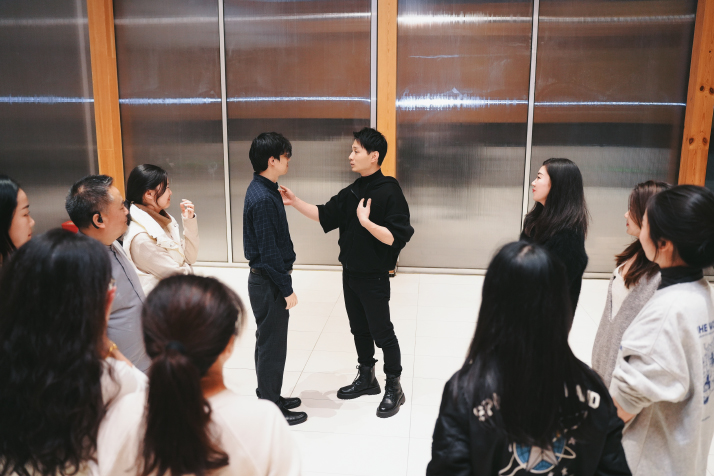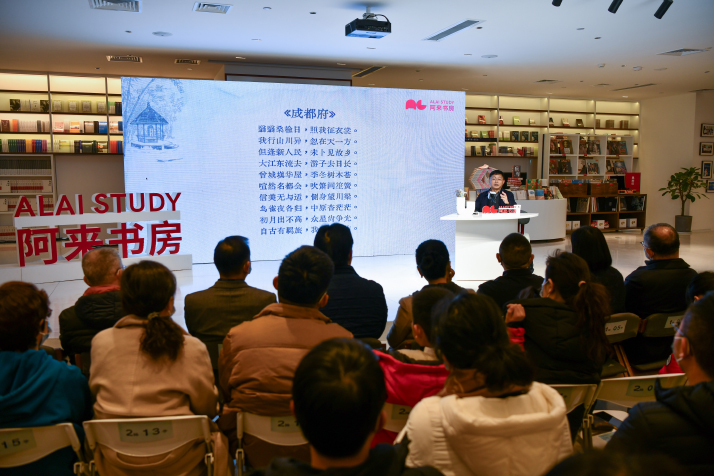| China |
| Off-duty wage earners invest in themselves by taking classes | |
|
|
 An after-work acting class run by Cooperation Units, a youth community in Chongqing Municipality, in November (COURTESY PHOTO)
For 75 minutes every Tuesday and Thursday nights, Xu Lingzi takes an acting class to pursue her dream of becoming an actor, leaving behind her day-time job at a company in Chongqing. Although acting had been her dream since she was young, Xu chose architectural design as her major at university and entered the corporate world upon graduation. Her passion for acting was reignited in September when she heard about the acting classes by accident. Xu said that in addition to gaining acting skills, the classes also help her to reflect on her life and to understand herself more fully. "There was one time that the acting coach noticed that I was wandering around on stage not knowing what to do. It made me realize that I was not decisive in my real life, which caused a waste of precious time. It was in that moment that I learned I needed to make a change," Xu told Beijing Review. Xu is one of an increasing number of young people who are opting to enrich their after-work lives by taking night or weekend classes. Popular review app Meituan Dianping revealed in mid-October that during the period beginning at the start of the year, the search volume for the term "night classes" on the platform had increased by 980 percent year on year, and the number of reviews of night classes had increased by 226 percent year on year.  A lecture on Tang Dynasty (618-907) poet Du Fu at a bookstore in Chengdu, Sichuan Province, in February 2022 (XINHUA)
Redefining learning Earlier this year, an evening art school initiated by Shanghai Mass Art Center, a cultural institution established by the Shanghai Municipal Government in 2016, went viral online. The school provides long-term art services to residents aged between 18 and 55, offering a diverse range of inexpensive classes, including dance, music, lifestyle, fashion and traditional culture. The classes are very popular and book out as soon as booking is open, leaving most unable to secure a place. The trend has spread nationwide. Similar programs for eager-to-learn nine-to-fivers have emerged in several cities, launched by both public institutions and companies. One of these, the Zhejiang Provincial Cultural Center in Hangzhou, Zhejiang Province, offers around 70 classes free of charge, with the most popular being the makeup lessons. "These after-work classes are meeting the diverse needs of young people," said Wang Chao, founder of the after-work class program that Xu attends at Cooperation Units (CU), a youth community in Chongqing. Some people, like Xu, want to pick up the hobby they developed as a child but never had the opportunity to learn systematically; some wish to learn a skill that makes them more competitive in the job market; some want to relax and have something to do rather than being glued to short videos on their smartphone screen; others want to expand their social circle and meet more people sharing the same interests. The CU program, which began in late October, has grown quickly. In a month, the 27 courses it provides have attracted more than 200 students in total. Each 1-hour class costs students just 50 yuan ($7), of which 35 yuan ($5) goes to the instructor and 15 yuan ($2) goes toward the program's operating costs. "Currently, the program is not profitable, but I hope in the future it can be, so that it can be viable in the long term," Wang told Beijing Review. So far, the courses include acting, calligraphy, ukulele and photography, and the most popular class is a lecture series on The Book of Changes, an ancient Chinese book of divination and a source of Confucianism and Taoism. In the near future, more classes including facial yoga and short video planning will be added according to the interests of attendees. The CU instructors all work there part time and are professionals who stand out in their respective fields. "I don't think any of the teachers here are joining the program for money," said Zhou Afen, an acting coach at CU who also runs her own acting studio. "In my case, I'd like to promote the performing arts among the wider public." "Acting can help people to learn more about themselves and gain an increased sense of purpose in life," Zhou added. Wang hopes the program will change people's traditional concept of education and schools, as well as teachers and students. "Learning is far beyond gaining knowledge on campus; rather, it can happen anywhere at any time. We need to break the boundaries and pass on the untapped knowledge possessed by anyone, not just 'the teachers,' to people who are willing to learn. In this sense, anyone can be a teacher or a student." Ideally, such programs should be available in all residential communities across the country, helping to create a society in which people enjoy learning, Wang added. Young people aren't attending after-work courses to earn an academic certificate or to achieve quick success and instant benefits. This makes them less anxious and allows them to enjoy themselves more during the learning process, according to Zhang Huajun, an associate professor of pedagogy at Beijing Normal University. "The classes can provide a space for them to achieve self-healing and self-adjustment, and bring more possibilities into their lives," she told national newspaper Guangming Daily. Going online As the number of online learning platforms grows, so do the options available to aspiring students. For example, MOOCs, or massive open online courses, first introduced in Canada in 2008, began gaining increasing popularity in China in 2013. By late 2022, 370 million people had registered to take more than 61,900 MOOCs in China. On NetEase Open Courses app, launched by Internet technology company NetEase in 2010, users can watch videos of courses taught by renowned professors from prestigious universities worldwide. The government is also providing support for the development of online courses. Since 2022, China's Ministry of Education has implemented the national education digitalization strategic action, which promotes the open sharing of education resources and the application of advanced technologies in the process. Many individuals from a wide variety of fields also share their ideas and knowledge on popular video-sharing platforms like BiliBili and Douyin, the Chinese version of TikTok. In particular, BiliBili has a Knowledge Section dedicated to serving this purpose. The company revealed in late October that in the past year, 243 million people used the platform to gain skills or knowledge, 5.5 times the number of college students in China. Among them, 72 percent were born in the 2000s and this demographic group was also the main audience of videos related to science and technology. BiliBili said the most trending science and technology topic on the platform is large language models, which include ChatGPT developed by U.S. company OpenAI and ERNIE Bot launched by Chinese tech giant Baidu. So far this year, 3.3 million videos on the topic have been uploaded to the platform. "When we break through the constraints of time and space, as well as the definition of teachers and students, education has infinite possibilities," Wang concluded. (Print Edition Title: Studying After Work) Copyedited by G.P. Wilson Comments to luyan@cicgamericas.com |
|
||||||||||||||||||||||||||||||
|